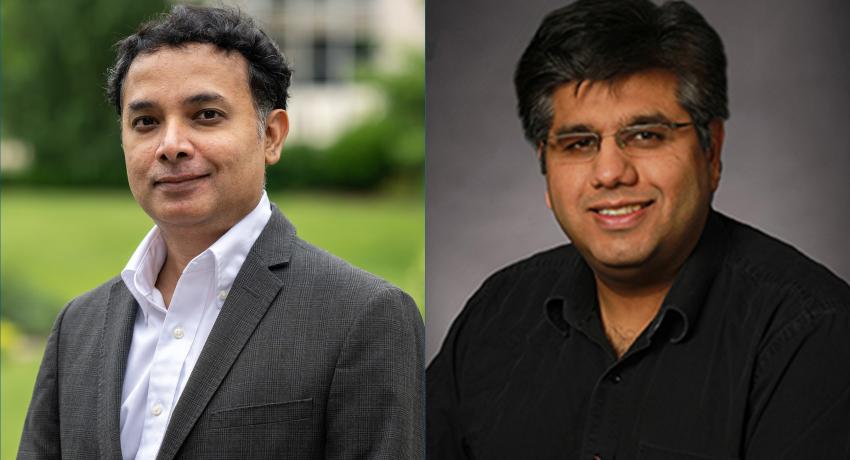Penn State College of Engineering professors Swaroop Ghosh, left, and Vishal Monga, right, pose for separate headshots. Credit: College of Engineering/Penn State.
By Jocelyn Bilker
UNIVERSITY PARK, Pa. — Swaroop Ghosh, Penn State professor of electrical engineering and computer science, and Vishal Monga, Penn State professor of electrical engineering, have been selected as 2025 fellows of the Asia-Pacific Artificial Intelligence Association (AAIA).
Ghosh was recognized for his contributions to “artificial intelligence for drug discovery and autonomous systems,” according to the AAIA. His research at the intersection of AI and hardware drives innovation in energy-efficient computing, cybersecurity, and critical applications like healthcare and automation.
Monga has been named AAIA fellow for "outstanding research towards data science and artificial intelligence methods in imaging science," according to the notification letter from the AAIA. His work has significantly advanced the application of machine learning techniques to complex image understanding problems, and he has published extensively in top-tier journals and conferences. His work focuses on robust and interpretable AI models for signal and image processing applications.
“The elevation to AAIA fellow is a testament to the research achievements and esteem in which Swaroop and Vishal are held,” said Thomas La Porta, the director of Penn State's School of Electrical Engineering and Computer Science and Evan Pugh Professor. “This recognition reflects very positively on the electrical engineering department of Penn State and is an example of the outstanding faculty we have.”
His sentiments were shared by Madhavan Swaminathan, the William E. Leonhard Chair Professor and head of the Department of Electrical Engineering and the director of CHIMES, who recognized the broader impact of the honor.
“As the department head, I am proud of the accomplishments of both Swaroop and Vishal, who are making tremendous contributions in AI as it relates to drug discovery and imaging,” Swaminathan said. “I look forward to continued contributions from both as we continue to expand in AI at Penn State.”
Ghosh holds a doctorate from Purdue University. Before joining academia, he worked as a senior research and development engineer at Intel. Ghosh has served as an associate editor of journals such as the Institute of Electrical and Electronics Engineers (IEEE) Computer Architecture Letters, IEEE Computers and IEEE Transactions on Computer-Aided Design. He has also served on technical program committees of over 25 Association for Computing Machinery (ACM)/IEEE conferences, including Microarchitecture, International Symposium on High-Performance Computer Architecture, Design Automation Conference and International Conference on Computer-Aided Design.
He has received more than 20 awards for excellence in research, advising and teaching, most notably the Defense Advanced Research Projects Agency Young Faculty Award and Director’s Fellowship, ACM Special Interest Group on Design Automation Outstanding New Faculty Award, IEEE Computer Society’s Technical Committee on Very Large-Scale Integration (TCVLSI) Mid-Career Award, Northeastern Association of Graduate Schools Geoffrey Marshall Mentoring Award and Penn State Graduate Faculty Teaching Award. He has also received best paper awards at the IEEE Hardware Oriented Security and Trust Conference, the ACM International Conference of the Great Lakes Symposium on VLSI and the American Society of Engineering Education Annual Conference. Ghosh is a fellow of IEEE and a distinguished speaker of ACM.
Monga has been on the EECS faculty at Penn State since fall 2009. From 2005-09, he was an imaging scientist with Xerox Research Labs. He has also been a visiting researcher at Microsoft Research in Redmond, WA, and a visiting faculty at the University of Rochester. Over the course of his 15 years as a professor at Penn State, Monga has made internationally acclaimed contributions at the intersection of signal processing and machine learning with applications in computational imaging and automotive radar.
Monga's research has been recognized via the U.S. National Science Foundation CAREER award. He is also a recipient of the 2019 Penn State Engineering Alumni Society (PSEAS) Outstanding Research Award and the 2022 PSEAS Premier Research Award. For his educational efforts, Monga received the 2016 Joel and Ruth Spira Teaching Excellence award. He is a 2025 fellow of IEEE and was inducted into the US National Academy of Inventors in 2022 for impactful contributions to the innovation ecosystem. He holds 45 US patents.
The AAIA aims to advance the development and application of AI in diverse fields — including medicine, transportation, energy, robotics and computing — through academic research, conferences, publications, science exhibitions and educational programs, according to the AAIA’s website.
Previously, Swaminathan and Doug Werner, John L. and Genevieve H. McCain Chair Professor, were selected as 2023 AAIA fellows.

